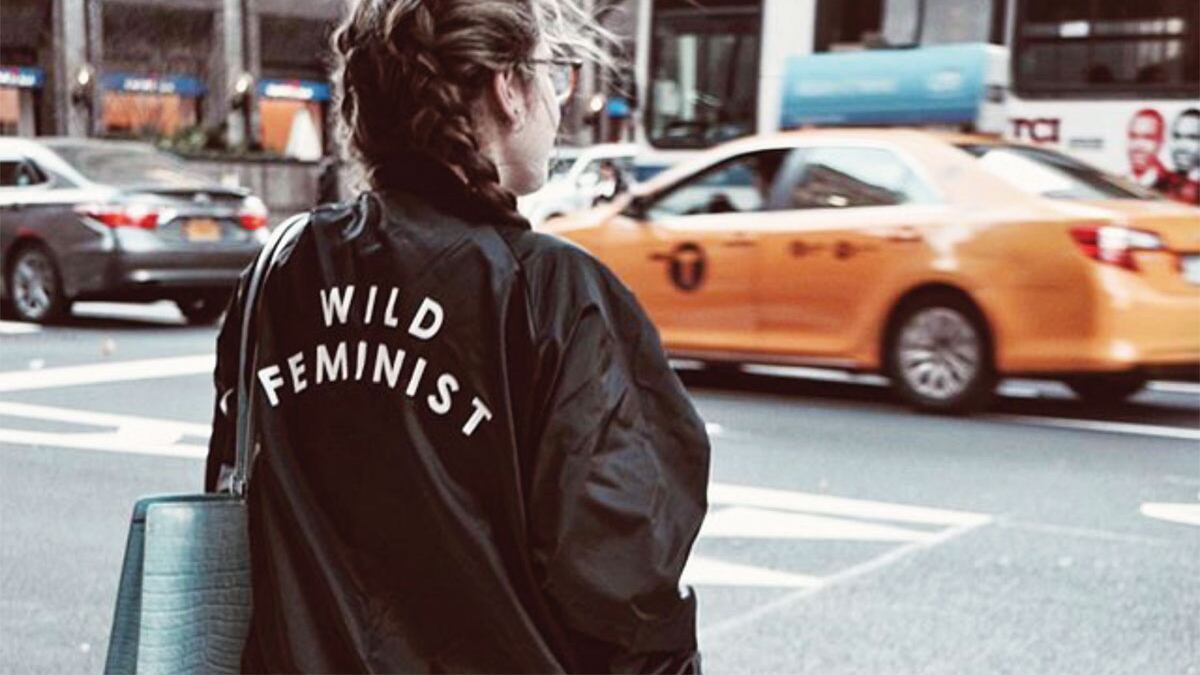From Jacqueline Kennedy's pink Chanel skirt suit to Michelle Obama's uproarious decision to show off her bare arms in her first photo as first lady, political American women have—for better and certainly for worse—been defined in large part by their sartorial choices.


Symbiotic with the fashion of politics, though, is the politics of fashion as it's worn by the everyday women not fortunate enough to marry a president, let alone (gasp!) run for office themselves, at least not yet. Political statements compellingly designed and printed on a shirt, button or patch speak almost as loudly and even more directly than words themselves, and in 2017, as a means of solidarity against President Trump, you'll be seeing a lot more of them.
Emma McIlroy, co-owner of Portland fashion brand Wildfang (who carries a whole line of shirts, jackets and hats emblazoned with the slogan "WILD FEMINIST") emphasizes that the use of original slogans and mass screenprinting toward political ends is hardly new.
"We stand on the shoulders of giants," she says. "We are only here because of the work done by those before us."


As far back as Warren Dayton's 1960s mass production of T-shirts depicting César Chávez and the Statue of Liberty's amputated torch, graphic fashion became an essential vehicle to resist oppressive norms: gender discrimination, reproductive rights infringement, unchecked corporate greed, and systematic racial injustice.
In McIlroy's view, we're at another historical crossroads where fashion-dispersed feminism and other social messaging can profoundly shake and reshape mass political views.
"Fashion and political activism have probably always gone hand in hand because they are both controversial," she says. "Designers and creatives aren't afraid to make a statement and upset some people, which aligns well with politics."
Among the unafraid is Nicole LaRue, the lesbian activist and illustrator who designed the logos and branding for the Women's March on Washington in response to Donald Trump's inauguration.
"It's an easy impact," says LaRue, who feels that designers, women designers in particular, are tired of being expected to design on the base goal of prettiness as opposed to social impact. "It's a loud voice, graphically. I think people are drawn to being able to show what they're thinking and say, 'I'm a part of this.' Fashion is the perfect medium for that."
Especially since becoming involved in the march, LaRue says she sees political fashion everywhere.
"There are pop-up shops now in D.C. that are selling some of the designs that I made for the march, and there are heaps of other feminist things being sold in the same place."
Why now? LaRue and McIlroy both gave the obvious answer—Trump.
"I think something's gotta give," says LaRue. "We need a louder, bigger voice, and maybe that's what printed T-shirts and printed fashion will give us—solidarity."




Welcome to the Fashion Issue 2017
We Picked Portland's Best 10 New Small Shops
Are Slide-On Sandals and Snap-Up Jogging Pants Cool Agin? The Answer May Surprise You
High-Low Fashion Picks From Two of Portland's Most Style-Obsessed People
The NBA's Great Forgotten Shoe Endorsements
Women's Fashion Takes Up Arms Against the Trump Regime
The Six Sweatshirts You Need to Survive Winter in Portland
The Coolest Sneaker of the Last Year Exists Because a Portlander Wanted To Met Bug's Bunny
We Asked People What Their Favorite Clothing Store in Portland Is
